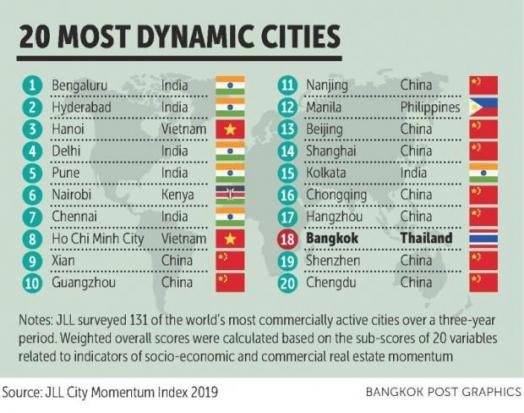Bangkok among world’s 20 ‘most dynamic’ cities
Bangkok has maintained its position among the world’s 20 most dynamic cities, ranking 18th in the sixth City Momentum Index published by the property consultancy JLL.
The index measures momentum for 131 commercially active cities by tracking a range of socio-economic and commercial real estate indicators over a three-year period to identify the urban economies and real estate markets undergoing the most rapid expansion.
According to the index, momentum in the Bangkok economy has been increasing gradually over the past two years. As a key hub of Southeast Asia, the capital has seen visitor numbers rise dramatically over the past decade.
The launch in 2016 of the Thailand 4.0 strategy, aimed at attracting new investment to transform the economy, appears to be bearing fruit, with foreign direct investment (FDI) rebounding in 2017, JLL observed. At the same time, infrastructure improvements are under way in Bangkok, with four new mass transit lines under development along with two extensions to existing lines.
Outlook: The political uncertainty that Thailand is experiencing makes it less easy to assess whether Bangkok’s momentum will continue this year. While business has applauded the announcement of the March 24 general election date, political uncertainty is expected to continue at least until a new government is formed after the elections.
But Suphin Mechuchep, the managing director of JLL Thailand, expects the impact of pre-election uncertainties on business investment decisions to be short-term.
“Confidence should resume after a new government is formed,” she said.
ASIAN DOMINANCE
Asia is home to 19 of the top 20 cities in the JLL index, highlighting the continuing shift of rapid urban growth from West to East. The absence of European and American cities reflects Asia’s continued rapid economic growth, driven by globalisation, innovation and demographic factors.
Overall, Indian and Chinese cities dominate the rankings, accounting for three-quarters of the top 20. Leading the pack are Bengaluru and Hyderabad in India, followed by Hanoi in third place. The only non-Asian city on the list, Nairobi (sixth place), is heavily influenced by infrastructure-focused investment from China.
Although the global economic cycle is in its late stages, there are still many cities where real estate and economic growth remain robust, according to JLL. But while strong growth brings opportunities for economic and social development, it also brings challenges that cities must address to ensure short-term growth transitions into long-term momentum.
Investing in infrastructure and greater transparency is key to the transition, the company said: “These cities also need to address the environmental and social impacts of rapid growth such as social inequality, congestion and environmental degradation. The provision of smart, efficient and productive real estate and increased transparency are key factors in driving long-term, sustainable urban growth.”
Transformative real estate: Thoughtful and innovative development — such as regeneration projects with a long-term vision to nurture new businesses and improve lives — is essential, as are large-scale infrastructure projects that help combat congestion-related problems and improve accessibility.
Manila (ranked 12th), for example, is one of the densest cities in the world, with an expanding population. The Philippine government has committed to an extensive infrastructure programme called Build Build Build, which includes more than 2,000 projects. These are expected to reduce congestion, increase power supply reliability, reduce the impact of climate change, and redevelop urban areas.
CREATING LIVEABLE CITIES
Technological innovation in the form of greener and smarter buildings also plays an important role in answering the environmental challenges brought about by rapid growth. For example, the Chinese city of Xian, ranked ninth in this year’s index, has installed an innovative 100-metre-tall air purifying tower to reduce smog and improve air quality.
Bangkok will gradually benefit from different development projects that have been launched in recent years under Thailand 4.0, aiming to elevate the country to the status of a high-income nation, reduce inequality and promote environmentally sustainable growth and development.
Sustainable long-term momentum and a maturing economy are often supported by long-term foreign direct investment and transparent governance.
India’s fastest-growing cities have been successful over recent years, attracting high levels of FDI, with structural reforms (including the Real Estate Regulation and Development Act), encouraging more real estate investment from foreign buyers.
A similar story is playing out in Chinese cities, such as Beijing and Shanghai, which are both on the verge of joining the ranks of the world’s transparent real estate markets, JLL said.
Source: https://www.bangkokpost.com/business/news/1617366/bangkok-among-worlds-20-most-dynamic-cities


 Thailand
Thailand




